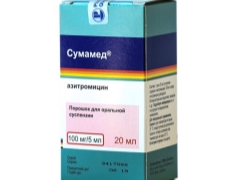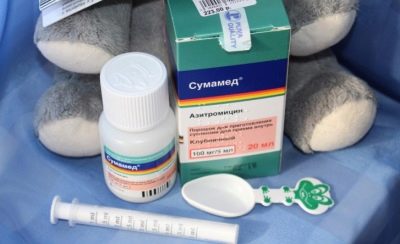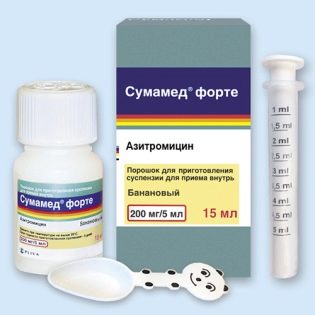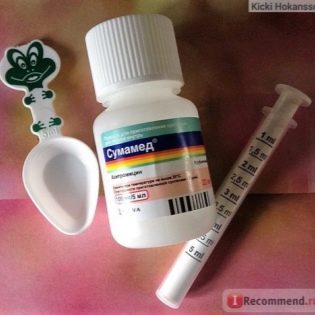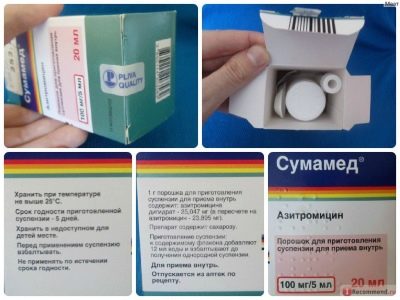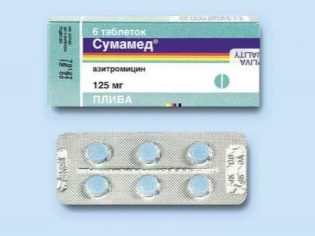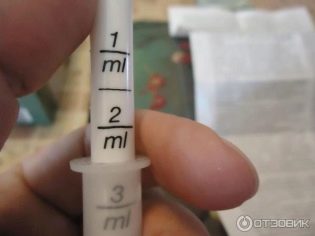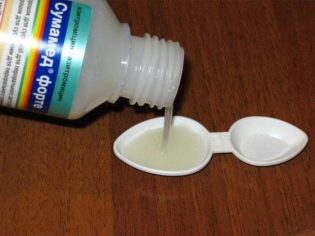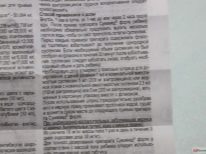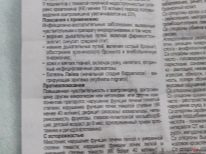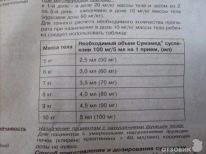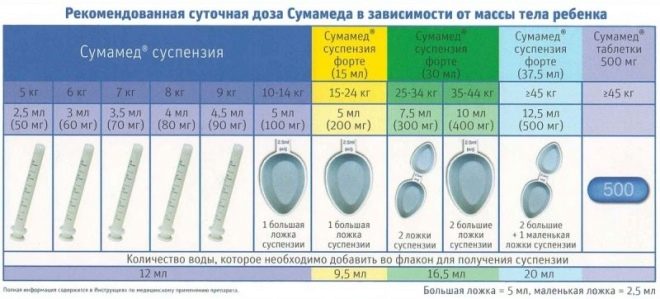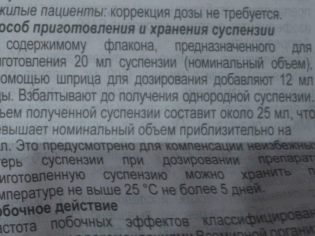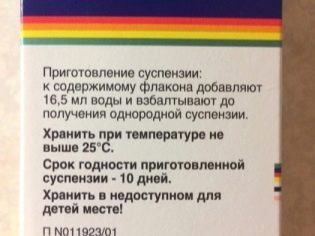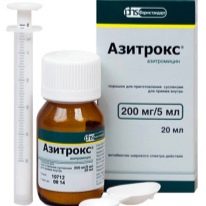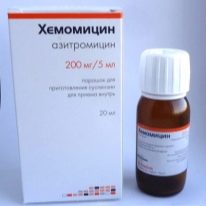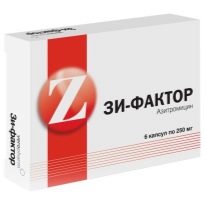Sumamed suspension for children: instructions for use
Sumamed is one of the popular antibacterial drugs allowed in childhood. It is prescribed to eliminate the bacteria that provoke otitis, bronchitis, sinusitis and other diseases. So that little patients did not protest against the treatment, one of the forms of Sumamed was made a sweet-tasting suspension. When it is applied, in what dosages is prescribed for patients of different ages and what similar drugs can be replaced?
Release form
Sumamed suspension is sold in white plastic bottles of 50 ml with a tight lid. Inside this bottle is placed a little less than 21 grams of white-yellow powder that smells like strawberries. Together with the bottle in the box there is a paper instruction and a measuring syringe with graduations or a measuring spoon. After 12 ml of water is added inside the bottle, 20 ml of white-yellow homogeneous liquid with strawberry flavor and odor is formed, which is often called syrup.
The suspension also produces a drug called Sumamed Forte. His difference from the usual Sumamed is a higher dosage of antibiotic. This medicine is represented by three different options:
- Powder yellowish with a smell of banana. It is placed in a plastic white bottle with a volume of 50 ml in the amount of slightly more than 16 grams. When 9.5 ml of water is added to it, 15 ml of medicine with banana flavor is obtained.
- Strawberry-flavored powder which in an amount of about 29 grams is packed in plastic white bottles with a capacity of 100 ml. To prepare a suspension, 16.5 ml of water must be added to this powder. The result is 30 ml of sweet strawberry medication.
- Powder that smells like raspberries. Its quantity in one bottle, capable of containing 100 ml of liquid, is approximately 35.5 grams. Pouring 20 ml of water inside the bottle, a raspberry suspension is obtained, the nominal volume of which is 37.5 ml.
Composition
The main ingredient of the Sumamed suspension is called azithromycin. It is contained in the drug in the form of dihydrate and its amount in 5 ml of the finished medication is 100 mg. Sumamed Forte also contains azithromycin dihydrate, but the dosage of this ingredient in 5 ml of suspension, regardless of taste, is 200 mg.
Auxiliary components in all variants of the suspension are the same, except for different flavors. The powder contains xanthan gum, silica and titanium dioxide, hyprolose, sodium phosphate and sucrose.
Operating principle
Azithromycin in the suspension has a bacteriostatic effect on various microorganisms, inhibiting the formation of proteins in microbial cells. It binds to the pathogen ribosomes and inhibits specific enzymes involved in the synthesis of protein molecules. As a result of this effect, the growth of bacteria slows down, but if the concentration of the drug is high, then it can destroy microorganisms.
The range of effects of Sumamed is quite wide, because this drug affects:
- Staphylococcus;
- Pyogenic streptococci;
- Hemophilic sticks;
- Pneumococci;
- Legionella;
- Gonococci;
- Pasteurella;
- Clostridia;
- Borrelia;
- Fuzobakterii;
- Chlamydia;
- Mycoplasma;
- Moraksella.
Indications
Sumamed is recommended for infections that cause bacteria that are sensitive to azithromycin. Suspension appointed by:
- With inflammation of the middle ear, tonsils, paranasal sinuses and other ENT organs;
- With acute bronchitispneumonia and other infectious diseases of the respiratory system;
- With the defeat of bacteria of the skin and soft tissues;
- With borreliosis in the initial stage.
From what age is prescribed?
Sumamed in suspension is recommended for the treatment of children aged from 6 months to three years. This medicine is contraindicated to give babies who have not yet turned six months, and patients older than 3 years it does not fit because of the large amount of medication (transferred either to Forte suspension or to tablets of 125 mg and 250 mg).
Sumamed Forte can also be appointed from the age of six months, but on condition that the baby weighs more than 10 kilograms.
Contraindications
Neither Sumamed nor Sumamed Forte can be given to children in such cases:
- In case of intolerance to azithromycin or another ingredient of the suspension;
- When hypersensitivity to other macrolide antibiotics;
- In severe liver diseases that impair the function of this organ;
- In severe renal pathologies affecting the excretory function;
- With the deficit of isomaltase and sucrase, as well as with glucose-galactose malabsorption;
- When fructose intolerance.
Sumamed treatment should be monitored by a doctor and carried out with caution in myasthenia, moderate and mild disorders of the kidneys or liver, bradycardia, dehydration, arrhythmias and diabetes.
Side effects
After taking Sumamed, some children have headaches and negative symptoms from the digestive system (diarrhea, nausea, etc.). In addition, quite often the drug affects the cellular composition of the blood, causing a decrease in the number of lymphocytes and an increase in monocytes, eosinophils, neutrophils and other cells.
More rarely, the suspension can cause swelling, fatigue, fever, back pain, skin rash, sweating, shortness of breath and other symptoms.
When they occur, you must consult a doctor to replace the drug with another treatment.
Instructions for use
To prepare the suspension, you need to collect the amount of water specified in the instructions with a measuring syringe (it is different for Sumamed and Sumamed Forte's different tastes). Pour the water inside the bottle, you need to close the bottle cap and actively shake the drug. So get the suspension in a slightly larger volume than the nominal, for example, if the nominal volume indicated 30 ml, then the dilution is about 35 ml. This is done to compensate for possible errors during dosing of the drug.
The medicine is given to the child once a day. In this case, the use of the suspension should not be combined with food intake. The medication should be drunk either before meals one hour or 2 hours after the child has eaten.
Dilute the finished suspension with water is not necessary. If it is difficult for a child to swallow it, it is better to give him to drink the medicine first, and then offer some water.
Since the active ingredient of the suspension settles to the bottom during storage, the medicine should be shaken before each use. For the dosing of the drug using a syringe with graduations of 1 ml, which can hold 5 ml of suspension. In some packs of Sumamed there is also a measuring spoon, which can measure 2.5 or 5 ml of the preparation.
After giving the child a suspension from a spoon or syringe, they should be washed with water and dried, and then put in a dry place until the next use of the medicine.
Sumamed dosage is determined by the weight of the child, and taking into account his diagnosis. If a small patient has been diagnosed with an infection of the respiratory tract, skin or ENT organs, then he is prescribed 10 mg of azithromycin per day per 1 kg of his weight. For example, if a baby weighs 6 kg, it needs 60 mg of the active substance, which it will receive from 3 ml of suspension.In this dose, the medication is taken three days in a row, that is, the course dose of the medicine is 30 mg / kg (for the child from our example, this would be 180 mg of azithromycin, that is, 9 ml of the drug).
If a child has tonsillitis or pharyngitis triggered by pyogenic streptococcus, Sumamed also give 3 consecutive days, but the daily dosage of the drug is 20 mg / kg, and the course dose - 60 mg / kg. For the treatment of borreliosis on the first day, the patient is given 20 mg of azithromycin per 1 kg of its mass, after which the medication is used in a daily dosage of 10 mg / kg for another 4 days.
Dosing Sumamed Forte is the same as the usual Sumamed. The only difference is that 1 ml of this suspension is not a source of 20, but 40 mg of azithromycin, which is taken into account when calculating the right amount of sweet medicine. For example, if the weight of a small patient is 12 kg and he needs to be given 120 mg of active substance per day, then instead of Sumamed in an amount of 6 ml, Sumamed Forte can be used, a single portion of which will be only 3 ml. The maximum daily dose for children of any of the drugs corresponds to 500 mg of azithromycin.
If the suspension is missed, drink the drug should be as soon as possible, as soon as he remembered. Further medication should be administered within 24 hours after the missed dose.
Overdose
In a situation where a child accidentally drank more of the suspension than is allowed at his age, symptoms such as vomiting, hearing loss (temporary), diarrhea, severe nausea, and others may occur. To eliminate them, one should seek medical help, wash the patient's stomach and give symptomatic remedies that the doctor will prescribe.
Interaction with other drugs
Sumamed may affect treatment with many other drugs, such as ergotamine, cyclosporine, amiodarone, digoxin, or cyclosporine. A complete list of drugs that should not be used simultaneously with Sumamed is given in the instructions for the suspension. If the child is already taking any medication, then it is important to inform the doctor before starting to give him Sumamed.
Terms of sale
Both Sumamed powder and all types of Forte suspension are sold by prescription, therefore, a doctor’s examination is required before purchasing such an antibiotic. The average price of Sumamed in suspension is 200 rubles, for one bottle of Forte with banana flavor you need to pay about 340-350 rubles, and a bottle of powder that smells like raspberries or strawberries costs about 500-570 rubles.
Storage conditions
The bottle with Sumamed powder is valid for 2 years from the date of manufacture. However, after adding water, the finished suspension can be stored at a temperature of up to +25 degrees for no more than 5 days. Forte can also be stored at room temperature by hiding the medicine in a place where it will not be accessible to children. The shelf life of such a drug is also 2 years.
After opening the vial and adding water, liquid medicine with a banana flavor (15 ml) can be stored for up to 5 days, and the raspberry and strawberry suspension is stored for up to 10 days.
Reviews
On the treatment of children Sumamed in suspension, most of the reviews from parents are positive. They praise the medicine for fast healing effect, detailed instructions, pleasant taste and the ability to store at room temperature. According to moms, the side effects of the drug in most cases did not occur. Only rarely did the drug provoke diarrhea, headache, allergic rash, and other unpleasant symptoms.
Among his shortcomings, many parents mention only a fairly high price, which in some cases, decide to use similar antibiotics, which are cheaper.
Analogs
Instead of Sumamed, other drugs may be administered as a suspension with the same active ingredient, for example:
They affect the same pathogens and are discharged to children older than 6 months in the same dosages as Sumamed. In addition, the doctor may prescribe another antibiotic macrolide to the child, for example:
- Macropene. This medicine contains midecamycin and is produced in granules for the preparation of suspensions (prescribed from birth) and tablet form (prescribed from 3 years of age).
- Klacid. This suspension on the basis of clarithromycin, like Sumamed, can be given from six months of age, and tablets are prescribed to 3-year-old patients and older children.
- Roxithromycin. This macrolide antibiotic effectively deals with bacterial infections in children older than 2 months. It is produced in tablets, which are dissolved before taking.
- Vilprafen. The action of this antimicrobial agent provides josamycin. For children weighing more than 10 kg, this medication is prescribed in dispersible tablets (Solutab).
- Rovamycin. This medicine on the basis of spiramycin comes in tablet form and is used from 3 years of age.
See below for how to dilute the suspension.
